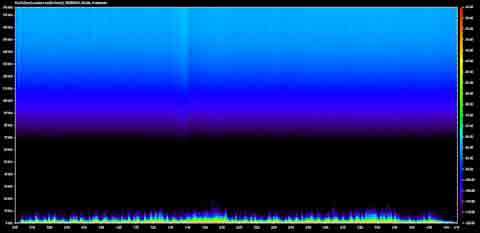I only mentioned the reported difference between real-time and off-line conversion because a) someone asked, and b) if you are an "objective anti-audiophile" person, then you certainly don't believe there is any difference between playing the file as PCM or playing the file as DSD...
Objective is not "anti-audiophile" - it just happens that the objective answer does not align with the audiophile's beliefs a lot of the time.
I personally can't say whether DSD sounds different/better from PCM, as I don't have DSD hardware here. I do know that DSD adds a lot of ultrasonic noise to the signal that needs to be filtered out though, and this is often
not done.
Here's an example of a file that was clearly DSD at some stage, then sold as 352.8kHz PCM:

That could certainly sound different to "regular" 16/44, or 24/48 PCM, due to distortion introduced from this ultrasonic noise.
There are a couple of reasons why DSD could sound better in theory (if the DAC is natively a 1-bit device for example) but finding DSD audio that has never been PCM at some point is difficult (you can't edit DSD) and once it's been converted to PCM, it's better staying as PCM. I hear that many engineers prefer DXD (24-bit, 352.8kHz PCM) to DSD these days.
Arguments like "computers were never designed for realtime applications, therefore they mess up the timing of the signal" have been proven wrong many times over, and there is no evidence (i.e. proper double-blind testing) to suggest that realtime vs offline decoding (e.g. FLAC vs WAV) makes any difference.

 Author
Topic: PCM2DSD Realtime Convert for DSD DAC (Read 35206 times)
Author
Topic: PCM2DSD Realtime Convert for DSD DAC (Read 35206 times)

